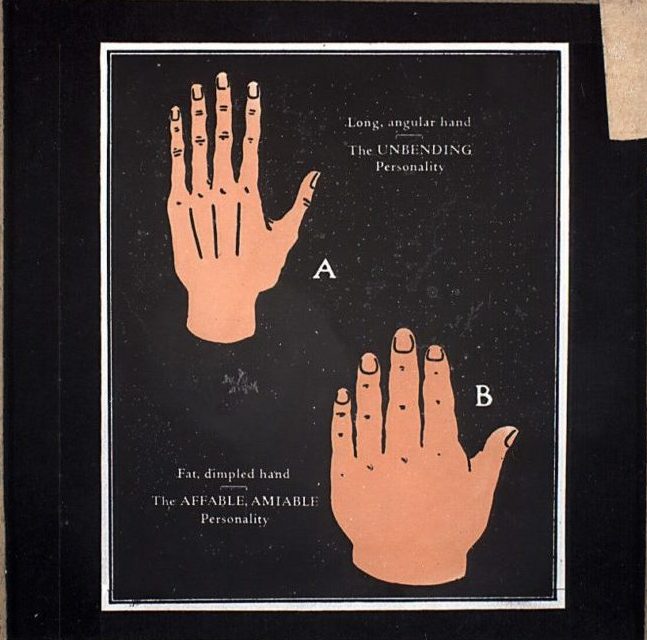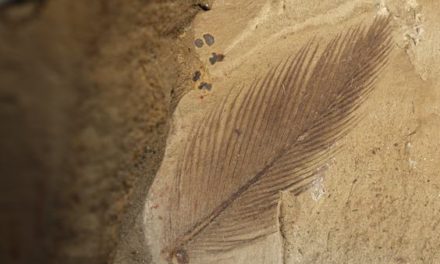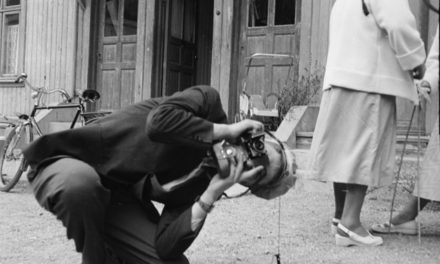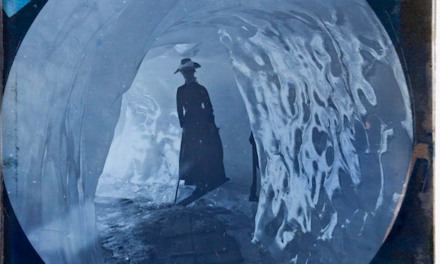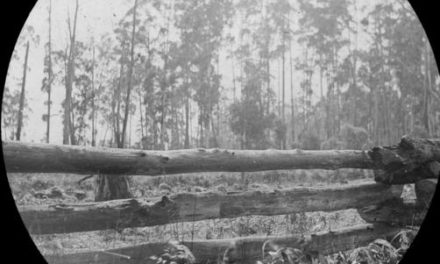Hand Type & Personality, ‘Unbending & Affable’, circa 1940s. Museums Victoria, Melbourne.
Cosmic Blues
by Elizabeth Gonzalez James
Six months at a restaurant is long enough to make you senior, enough to make you flounce through the place during lunch rush on a Thursday, five plates in your hand, calculating tax in your head and reciting the exact ingredients in the kibbeh. Six months gives you confidence that you know everything, everyone, all the backstories and ghosts that cling to people who end up in low-paying, family-owned restaurants.
But six months is nothing. Six months isn’t shit.
I arrived at Little Beirut one frigid Saturday morning, late, hungover, clutching a cup of coffee I’d paid for in dimes.
“Nicholas,” I shouted as I clanged through the glass door and past the wooden sign that proclaimed, Syracuse’s favorite hummus, “my car’s broken—help!” But I stopped at the hostess stand: instead of my stout, Lebanese boss, a thin, bloodless man was slumped at the staff table in the back eating soup and reading the comics.
I slowed as I neared him; something about him made me afraid to say hi. He looked up from his newspaper as I approached.
“Go ahead and sit down,” he said. His voice quavered at such an unexpected high pitch, mismatched to the man wearing five days of stubble, that I pulled out the chair across from him and tore the cellophane off a new softpack. “Can I get one of those,” he asked, eyeing the other nineteen Camel Lights in my hand.
I handed him a cigarette and watched him take a long drag, like he didn’t know when he’d get another smoke. At first glance he looked older—in his fifties or sixties—but close up his face, behind grizzle and grime, was smooth and his brown eyes were lively, darting between his food and the day’s Garfield.
“You new,” he asked. “I haven’t seen you before.”
“I’ve been here a while,” I said.
“You a college girl,” he asked, and I took it as an honest question, not an accusation.
I nodded.
“I’m Ray,” he said, and wiped his hand down his thigh before offering it to me.
“I’m Emily,” I said. “Are you going to work here?”
“I’ve been working here,” he said. “I come in, they give me something to do. I leave. I come back. That’s how it goes.” He paused and looked down at his soup bowl. “Hey—do they let you take the bread?”
“The pita,” I asked, blowing smoke over my shoulder. “Yeah, Nicholas doesn’t care.”
Then Ray lurched out of the chair in a motion that suggested wanting to be unseen, his body low like a badger. He returned with two pita that he held together and ate like a sandwich. “Mmh,” he said. “This Arab bread is good.” And he pronounced it ‘Ay-rab’ like the boys at my old high school.
“Actually,” I said, “I’m pretty sure the owner considers himself Phoenician, not Arabic.”
“We used to call ‘em ragheads when I was coming up,” Ray said, his eyes dancing. “Now, are ragheads considered Phoenician or Arabic?”
I blushed at the slur and looked around me, lest I be judged racist by association.
“I don’t think I’ve ever heard anyone use that word,” I said. “And I’m from Texas.”
“Words don’t mean shit,” he said, scraping out the last of his soup. “We all end up in the same place.”
“When did you get here?” Nicholas, the owner’s son and heir apparent, had snuck up behind me and placed a soft and unwelcome hand on my shoulder. He smiled down at me, his thick moustache and caterpillar brows splitting his round face into thirds; it was tempting to make a Mario Brothers comparison.
“I just got here,” I said, moving to put on my apron and get to work.
“Don’t rush,” Nicholas said, pulling out a chair across the aisle from me and, after sitting down, stretching his large, booted feet towards mine. Then, looking at Ray, he shook his head and frowned. “Goddammit, Ray, don’t take the pita. Come on. My old man’s downstairs.” And he jerked his head, the unspoken command and underpinning power structure palpable in the silent dining room.
“You got it, boss.” Ray swallowed the last of his pita and lurched out of his seat again.
“He’s interesting,” I said after Ray had disappeared through the kitchen. Nicholas’ crush afforded me the benefit of shirking my prep duties.
“Interesting is one way to put it,” Nicholas said.
“Why don’t you want him eating the bread,” I asked.
“‘Cause he’s a bum. I don’t know why my old man lets him around here.”
“You don’t mean he’s homeless?”
“Who knows,” Nicholas said, appearing to lose interest in the conversation. “Don’t let him talk to you, though,” he said after a pause. “Trust me. Stay far away from Ray.”
The next Saturday I had to get my car out of the shop before work. The garage was three buses away in the industrial fringe of Solvay. As I departed University Hill, sinking down into the city proper, the contrasts between Houston and Syracuse, my old home and my new, were striking. Nothing in my suburb predated the 1970s; Syracuse was an old man lying under a fraying blanket.
On the bus I opened my sociology textbook and began an article about inequality of conditions and inequality of opportunities, attempting to explain privilege to kids like me who’d grown up shuttling through life in a minivan, eating Goldfish crackers and bopping to Will Smith. But the bus was hot and the prose was dry, and I gave up and leaned my cheek against the cold glass window and watched the city, dormant under the previous night’s snow. I found myself thinking about Ray: what would he say about inequality of conditions and inequality of opportunities?
It was eighty degrees in Houston that morning. I remembered a quote from Willy Wonka and the Chocolate Factory, something Gene Wilder said when the children wanted to turn back and go home: “You can’t get out backwards. You’ve got to go forwards to go back. Better press on.”
When I arrived at the restaurant later that morning, hard gusts assailed my wrists, my earlobes—anything left uncovered. A great, tiered icicle had formed overnight and thrust dangerously from the roof of the restaurant towards the sidewalk. Ray stood lobbing snowballs at it to no avail. I nodded to Ray as I crossed under the icicle. A fat drop of icy water rolled off the end and splattered my forehead, sending me deep into my coat for comfort.
The restaurant was busy despite the weather and I spent the day in a fog—busing, filling, seating, smiling. At the height of the lunch rush, as I refilled iced teas, Nicholas ambushed me, swinging a Lord and Taylor bag and grinning. Nicholas had a habit in those days of buying me things—leather handbags, designer sneakers—gifts I’d never requested and would never repay him for. I’d act grateful, pretend to like whatever it was, and then conclude the charade with a one-armed hug. I thought the gifts were harmless. Nicholas was married, almost twice my age, and I supposed he was only living out some fantasy, enjoying the pretense of having a mistress without actual infidelity weighing on his conscience. It was a silly infatuation, I believed, and one that would abate with time, as soon as another pretty sophomore walked in the restaurant to ask if there were any openings. This was one of many lies I would tell myself about men.
And so it was under these assumptions that I accepted a bottle of perfume from him that day. Nicholas, always blind to other people’s dilemmas, had snagged me at the busiest part of my day. “It’s great,” I said, smiling wanly at the name, Britney Spears, scrawled across the bottle in loopy, black cursive. “Thanks.”
“It’s the new one,” Nicholas said, turning the bottle in my hands. “This was the last one in the store.”
“It’s great,” I said again, looking past Nicholas at a table waiting on Turkish coffees. “I’ll definitely use it.”
“How about now,” he asked.
“I just got triple sat,” I said, figuring the logic of customer service would deter him. But he only asked again, more pathetically the second time. “Fine,” I said, and I sighed and pushed my sleeves up off my wrists. Nicholas took his time with the bottle, looking at me and my arms with admiration, and finally letting out a jet of fragrance that smelled like strawberry bubblegum.
“You smell like a princess,” he said and leaned forward for a kiss.
“The Turkish coffee,” I said, dodging his lips. “Is it going to burn?”
“It’s fine,” Nicholas said, and tried to lean into me again.
“No,” I said and held him back, his lips three inches from mine.
Ray rounded the corner at that moment and took in Nicholas and me—my hand on his chest—and I blushed, feeling complicit in something I couldn’t understand.
“What next, boss,” Ray asked.
“Goddammit,” Nicholas said, and wiped his mouth with the back of his hand. “Ray, get the fuck out of here.”
He waited for Ray to disappear down the stairs to the basement and when he looked back at me, I saw that he’d been pushed too far, that we’d somehow crossed into an unknown adult realm of deep feelings and bruised egos and real, immediate consequences. I was nineteen, unprepared to stare down a grown man with children and a mortgage and tell him he was being childish.
“What’s your problem?” he asked. “Don’t I treat you nice? There are a lot of girls who’d like a boyfriend to buy them things.”
“You’re not my boyfriend,” I said, trying to maneuver out to the line where four plates of lamb stew waited, cooling. “We’ve never even kissed. I’ve got nothing to do with this.”
“Then let me be your boyfriend. I want to take care of you.”
My customers were twisting in their seats, searching in vain for their coffee. A metal pan clattered behind the line and several Lebanese curses were spat onto the floor after it. Nicholas, the manager in title if not in presence of mind, was finally compelled to leave me and I’d never been so happy to return to a room of irritable customers.
I avoided Nicholas for the rest of lunch and, at two o’clock, escaped Little Beirut. My red Camry, battered but not broken, sat under the morning’s accumulation of snow and ice. While I stood scoring the windshield, attempting to break ice with flimsy plastic, I heard the restaurant door bang open and looked up to see Nicholas tramping through the snow in a t-shirt, hugging his meaty arms to his chest.
“Dude,” I began, “you’re freaking me out.”
“I know,” he said, rubbing his face with his hands. “I’m sorry. I was an asshole this morning. I just—I think about you all the time and—” he looked down, “it’s like this shitty car,” and the Camry’s sagging front bumper looked forlornly out from under the snow. “I wish you’d let me get you a new one. This is what I can do for you. I can take care of you.”
“I’m an adult,” I said, my frustration doing little to help break the ice. “I don’t need anyone to take care of me.”
“Look at you,” he said, “you don’t even have de-icer.”
Ray emerged from the restaurant, blinking against the wind. He disappeared into an alleyway and came out wheeling a bicycle that looked held together by luck and duct tape. He crossed to where Nicholas and I were arguing and looked somehow joyful, blind to the fact he was about to ride a bicycle through tundra.
“It’s payday, boss,” Ray said, rubbing his hands together. Nicholas grunted and unfolded a few bills from a large roll.
“Ray, you’re not riding that thing out here,” I said. “It’s fifteen degrees out. Let me give you a ride.”
“Okay,” Ray said, moving to put the bicycle in the trunk.
“No,” Nicholas said, “no, no, no, no. He’s not getting in a car with you.” And Nicholas moved to block Ray from the trunk.
“Yes, he is,” I said, anger flushing my cheeks. “You’re not my father, you’re not my boyfriend—you’re not even my boss. You’re just a sad doofus who sits around a dirty restaurant waiting for his father to die so he can inherit the stupid hummus recipe. Leave me alone!” And I shoved Nicholas with both hands, though owing to our weight differential and my poor footing in the snow, I only pushed myself back six inches. Nicholas looked stricken. His lips parted and he took a step back to watch as I finished scraping the windshield and Ray succeeded in folding his bike into the trunk.
“See you later, boss,” Ray said with what looked like a smirk as he opened the passenger door. And as he did it there was a terrible cracking sound, like a peal of spring thunder. The three of us turned to look just as the icicle fell from the roof of Little Beirut and shattered in a thousand jagged pieces. The crash was so loud several doors opened along Marshall Street and other merchants popped their heads out, taking in the damage.
When I drove off Nicholas was still standing in the street in his t-shirt, alternating his glance between my car and the roof, watching for anything else that might fall.
Ray wanted to be driven to Liverpool and I asked how he was going to ride ten miles in such weather.
“I’ve seen worse,” was all he said.
I turned up my CD player and Janis Joplin’s throaty alto immediately warmed the car.
Ray grinned. “This lady,” he said, tapping the speaker, “she got it. She got the hard life.” He turned the volume up higher. It was Kozmic Blues, when Janis admonishes, “Don’t expect any answers, dear, For I know that they don’t come with age, no, no.” The car barreled past crumbling brick facades and pensile neon signs, artifacts of a hopeful age. We skirted Onondaga Lake, the smell of rotting egg cutting through wind and snow and reaching us in the car. When the song finished he turned the volume down and appeared to wipe a tear from his eye.
“She’s really great,” I said, for the second time that day feeling very young.
He wanted to be dropped off at a forlorn Irish bar a block from the lake, its only sign of occupancy a flickering green and orange cloverleaf posted in the window. “Um, can I actually join you,” I asked. “I’m pretty keyed up after fighting with Nicholas and I think I could use a beer.”
“Sure,” Ray said, and then snuffled and spat into the parking lot.
The bar was dim and charmless, with a wooden floor and pervasive mold smell. I was surprised to see other patrons, weather-beaten men and women with faces like old boats. The place was full of regret, regrets maybe not even earned in one lifetime but passed on genetically, one dismal generation begetting another.
We ordered two Labatts and sat at a wooden table under a picture of James Joyce.
I cleared my throat. “So did you grow up here?”
“Yep,” he said. “Here in paradise.”
I gave a gentle laugh. “And have you always worked in restaurants?”
“I get by.”
“You know,” I said, hoping to put Ray at ease, to bond over our common enemy, “you don’t have to call Nicholas, ‘boss.’ He’s an idiot. I told him I visited my cousin in Michigan and he asked me what state that was in.”
Ray waved his hand. “I’ve known that kid since his dad bought the place. He was a skinny, pimple-faced kid. All bones.”
I laughed and asked for more stories. We had another round and two more after that, me funding our evening with singles earned that afternoon. Ray was, as I’d hoped, a gifted conversationalist, confirming my suspicions that, off campus, I could receive a real education, learning humanism from real humans. He told me about his childhood—of barefoot expeditions through empty lots searching for edible mushrooms, of nights curled up on a cement floor, hugging a stray dog to his chest for warmth. But he wasn’t seeking pity. All his stories had a happy ending—he sold the wild mushrooms to help his mother and the stray dog ended up a cherished pet. He had a teflon quality to him, an imperviousness to judgment I’d never seen in anyone. I wanted to help him, find him a home and a vocation, because that much wisdom couldn’t be allowed to sleep under a bridge. Meeting Ray was destiny, I thought. I could help him find his bearings and, in return, he’d help me find mine.
As night descended more patrons trickled in. A burly man in fleece pants and combat boots sat down at the table next to us and Ray got quiet. “Green army boots,” he said, half to himself.
“Green army boots,” I asked, expecting another chestnut.
Ray sighed and gulped the rest of his beer. “I used to suck this guy off,” he began, with the nonchalance that I’d use on a story about losing my glasses. “He’d pay me a few bucks to come to his house and suck him off. About every month he’d find me at this bar on Salina, and he’d have to wait until his wife was out, and then I’d go up there and do it to him. Well, one night I get to his house and he’s got a friend there and the friend says he wants to watch. I say fine, but you’ll have to pay. I offer to suck the friend off but he doesn’t want it. When we’re done, they both drop me back at the bar and I don’t hear from either of them for a while. Then one day the friend shows up at the bar. It’s early—eleven in the morning. And the friend says, I want you to come with me to my house. So I say fine—I figure I’ll make a few bucks, and I go with him. And it’s a big fucking house out in Dewitt. Nice place. I go in there and he tells me to take a shower, get all cleaned up, and—I swear to God—he says he wants me to put on these green army boots. Nothing else, just the green army boots.
“This is some weird shit but I’ve seen weirder shit than this. So I clean myself up and put on the boots and I wait in this bedroom upstairs. After a while the guy brings me downstairs to the living room and there’s this plastic lawn chair in the middle of the floor and the guy has me stand up on it. And I don’t know what the hell he’s going to do but he’s an older guy and I figure I can fuck him up if I need to. He looks me up and down a few minutes, all quiet like, and then finally, when I’m about to ask him what the fuck it is I’m doing there, he pulls out his dick and starts jerking off. And that was it. That was the big fucking finale. He wanted me to stand there, buck naked, in these goddamn green boots, so he could jerk off.” And at the retelling Ray laughed so hard he smacked the table and spilled some of my beer. I couldn’t think of any way to respond so I fell into mimicry, laughing with Ray so as not to betray the pity and horror that wanted to paint my face.
“Can you believe that,” he asked. “He had me going out there for years—same thing, same boots, every time. Fuck.”
“Do you still—” I couldn’t bring myself to finish the question.
“Do I still suck dick for money,” he asked loudly, looking at me like I was stupid. “Fuck yeah, when I have to.”
I counted the empty bottles on the table and there were twelve. I had a thrusting pain behind my right eye and a strong desire to lie down on the floor. A woman at the bar was picking her nose and a puddle of something crept out of the men’s room. I wanted to go home, possibly all the way back to Houston, to sleep in my cloud-covered sheets and wake up to feel my parents’ cheap plush carpeting under my toes.
I was about to say goodnight, to will myself sober enough to drive home, when I felt Nicholas’ unmistakable hesitant grip on my shoulder. I looked up to find him hovering over me and casting a long shadow over Ray.
“It’s time to go,” he said.
“Sit down,” Ray said, sliding a chair away from the table with his foot. “Have a cold one.”
“Fuck you,” Nicholas said and strengthened his grip on me.
I twisted away from Nicholas’ hand and looked up at him, furious. “Why are you here,” I asked. “Don’t you have a family to go home to?”
“I said it’s time to go,” he said, and tried to raise me up out of my chair.
“If you touch me again I’ll scream.”
“You don’t want her to scream,” Ray said, and gave a thin, high-pitched laugh.
Nicholas was growing redder but I was too drunk for empathy. He crouched down and I made a show of crossing my arms and looking away, but he continued in a loud whisper anyway. “I told you, I don’t know how many times, that he’s no good. There’s things you don’t know about. Stuff from a long time ago. I know you think you can help him out, ‘cause you want to do the right thing, but he’s fucked up, okay? Now please, please come with me.”
Ray was peeling a label from a bottle and smiling to himself. “Nickie, you still got that mole on your back,” he asked, looking at Nicholas and winking. “Goddamn you were a skinny kid. No wonder you never had a girlfriend.”
Still crouched, Nicholas ground a fist into the palm of his hand. “If you talk to me again I swear to God I’ll slit your throat.”
“Your older boy looks a lot like you,” Ray said, laughing again in a way that was making me uneasy. “Does he like motorcycles, too?”
Nicholas was on top of Ray before I even realized he’d gotten up. The first punch caused a ribbon of blood to run from Ray’s nose; the second caught him in the gut and he folded like a pocketknife. Nicholas hit him again and again with fury that reached back decades and Ray took it, never blocking his face, like he was glad to have everything out in the open. I was aware of myself screaming but the sound was disconnected from the fight, like a delayed soundtrack mismatched to the action onscreen.
After what seemed like hours Nicholas pulled himself away—his face was pink and swollen and he’d been crying. I said his name, said it again, but he wouldn’t take his eyes off Ray, crumpled and bleeding on the floor. The other bar patrons were silent and watched the scene with what looked like resignation, as though violence was just a language recalled in moments of heat. I called Nicholas a third time and he finally looked up, but he was looking through me, somewhere else, somewhere I couldn’t see and didn’t want to anyway. He finally backed away from Ray, his eyes on the ground at what he’d done, and without a word went out of the bar.
I was still sitting at the table, and the twelve bottles of Labatt were still arrayed and undisturbed, but I had the sensation of something important slipping out and away from me, like sand spilling from a small rip in a bag. Ray wasn’t moving. I took off my sweatshirt, rolled it up, and placed it under his head. The bartender called the police, patrons began to clear. Soon it was just Ray and me. A small gurgling sound arose from somewhere in Ray’s chest and I answered it by whispering his name over and over, telling him the ambulance was on its way. I picked up his hand and was surprised by the scabs at his fingertips, the calluses on his palm. I heard a siren far down the Parkway. I imagined Nicholas, driving home, silently washing his bloody hands in the kitchen sink and sitting alone in the living room while his family slept a few feet away. Ray, if he lived—where would he go? Back to a concrete floor? The sun would come up and the buses would drive down University Hill and Nicholas would fry the falafel and I’d doze off in class and Ray would scurry back into the shadows…and inequality of conditions didn’t seem quite the right term anymore.
The bartender had gone out to smoke and left the door wide open and snowflakes reached us even at the back of the bar. The siren grew louder until red and blue lights danced across the windows and Ray’s face; I got dizzy watching them. A blonde woman held a clipboard and questioned me while two men bent over Ray and worked, listening, injecting, pumping, snow still blowing in through the open door. A man shouted at the bartender to shut the door, and as he did I could suddenly smell everything in the bar—cigarettes, urine, vomit and sweat, like I’d just pulled my head out of water. The woman snapped her fingers in my face—my eyes had strayed to Ray, now bare-chested, about to receive defibrillation. I looked back at her and asked her to repeat her question, though I had heard it the first time. The men applied pads to Ray’s chest, above a field of pink scars that ran like tiger stripes across his stomach, and delivered the shock. His body stiffened and released and the men readied the machine again. At the second shock Ray’s lips parted and his tongue dropped out of his mouth, and I remember worrying that a part of him was escaping, too. I finally turned back to face the woman and apologized. I didn’t even know his last name—what could I say?
Elizabeth‘s work has appeared in The Bold Italic, Foliate Oak, and Mothers Always Write, and she was a finalist in Glimmer Train’s 2016 Short Story Award for New Writers. She lives with her family in Oakland, California.

